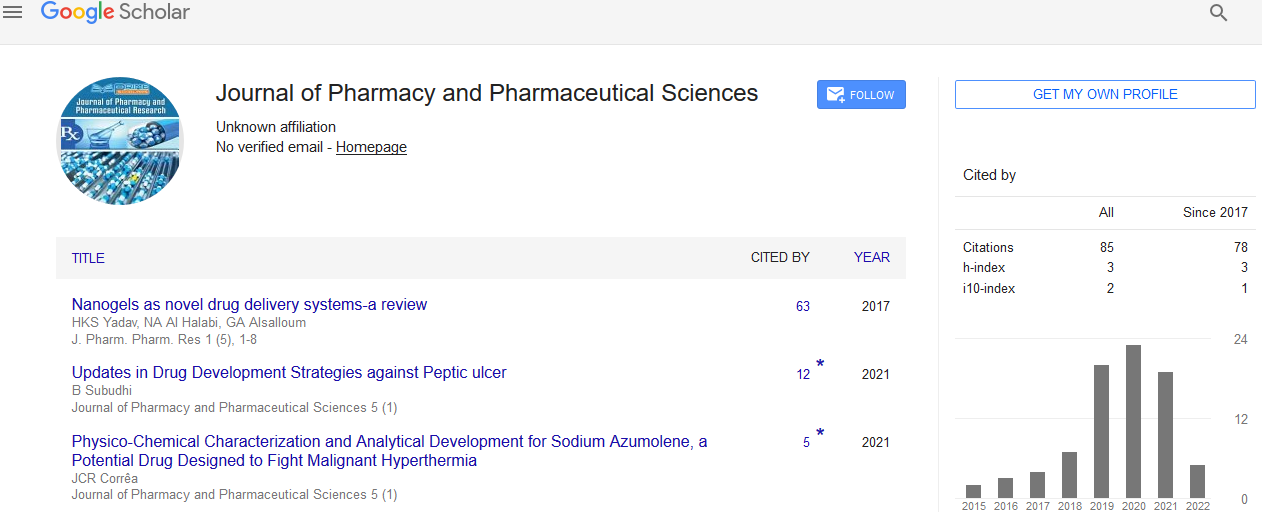Opinion - (2024) Volume 8, Issue 1
Exploring the Frontier of Drug Discovery: Molecular Pharmacognosy
Wu Xia*
Department of Pharmaceutics, Tianjin Institute of Pharmaceutical Research, China
*Correspondence:
Wu Xia,
Department of Pharmaceutics, Tianjin Institute of Pharmaceutical Research,
China,
Email:
Received: 28-Feb-2024, Manuscript No. IPIPR-24-19912;
Editor assigned: 01-Mar-2024, Pre QC No. IPIPR-24-19912 (PQ);
Reviewed: 15-Mar-2024, QC No. IPIPR-24-19912;
Revised: 20-Mar-2024, Manuscript No. IPIPR-24-19912 (R);
Published:
27-Mar-2024, DOI: 10.21767/ipipr.8.01.010
Introduction
In the quest for novel therapeutics, researchers are turning
to nature’s pharmacopeia for inspiration. Pharmacognosy,
the science of natural products, has long been a cornerstone
of drug discovery, harnessing the medicinal properties of
plants, microbes, and marine organisms to develop new drugs
and therapeutic agents. However, recent advancements in
molecular pharmacognosy have revolutionized the field,
enabling scientists to unravel the molecular mechanisms
underlying the therapeutic effects of natural products and
accelerate the discovery of next-generation medicines. This
article delves into the emerging discipline of molecular
pharmacognosy, its methodologies, applications, and
implications for drug discovery and development. Molecular
pharmacognosy represents an interdisciplinary approach that
integrates principles from pharmacognosy, pharmacology,
chemistry, genomics, and bioinformatics to elucidate the
molecular basis of the therapeutic properties of natural
products.
Description
Molecular pharmacognosy employs a diverse array of
methodologies to explore the chemical and biological diversity
of natural products and unravel their pharmacological
mechanisms. HTS techniques enable rapid screening of large
compound libraries derived from natural sources to identify
bioactive molecules with therapeutic potential. Automated
assays, robotics, and computational algorithms streamline the
screening process, allowing researchers to evaluate thousands
of compounds for their pharmacological activity against
specific molecular targets or disease models. Metabolomics
involves the comprehensive analysis of small molecules
(metabolites) present in biological samples, such as plant
extracts or microbial cultures. Metabolic profiling techniques,
including mass spectrometry and nuclear magnetic resonance
spectroscopy, provide insights into the chemical composition
and metabolic pathways associated with bioactive natural
products, facilitating the identification of lead compounds for
drug discovery. Structural biology techniques, such as X-ray
crystallography and Nuclear Magnetic Resonance (NMR)
spectroscopy, elucidate the three-dimensional structures of
target proteins and their interactions with natural product
ligands. Molecular modeling and computer-aided drug design
tools enable the rational design and optimization of natural
product-based therapeutics by predicting ligand-receptor
interactions and optimizing compound binding affinities.
Genomic sequencing and bioinformatics analyses facilitate
the identification and annotation of biosynthetic gene clusters
responsible for producing bioactive natural products in plants,
microbes, and other organisms. Comparative genomics,
transcriptomics, and genome mining approaches accelerate
the discovery of novel biosynthetic pathways and gene clusters
encoding pharmacologically relevant compounds.
Conclusion
By integrating molecular, chemical, and biological perspectives,
molecular pharmacognosy accelerates the identification of
novel drug candidates, elucidates their mechanisms of action,
and enhances their clinical translation. Moreover, molecular
pharmacognosy fosters interdisciplinary collaboration between
scientists, pharmacologists, chemists, and biotechnologists,
fostering innovation and synergy in drug discovery research.
Molecular pharmacognosy stands at the forefront of drug
discovery, bridging the gap between traditional medicine
and modern pharmacology through the elucidation of
molecular mechanisms underlying the therapeutic effects
of natural products. By leveraging advanced methodologies
and interdisciplinary approaches, molecular pharmacognosy
offers new avenues for the discovery and development of safe,
effective, and sustainable therapeutics to address global health
challenges.
Citation: Xia W (2024) Exploring the Frontier of Drug Discovery: Molecular Pharmacognosy. J Pharm Pharm Res. 8:010.
Copyright: © 2024 Xia W. This is an open-access article distributed under the terms of the Creative Commons Attribution License, which permits unrestricted use, distribution, and reproduction in any medium, provided the original author and source are credited.

